Why the capture of al Qaeda's Abu Anas al-Libi is a big deal
U.S. troops, the FBI, and CIA captured one of America's most-wanted terrorist suspects in Libya this weekend


A free daily email with the biggest news stories of the day – and the best features from TheWeek.com
You are now subscribed
Your newsletter sign-up was successful
U.S. forces conducted two high-profile raids against Islamist militants in Africa on Saturday. In the first, Navy SEALs slipped ashore before dawn near a villa in Barawe, Somalia, to capture a senior operative of al Shabab, the group behind the deadly terrorist attack at an upscale mall in Nairobi last month. Greeted with sustained gunfire, the SEALs reportedly left unharmed but without their quarry, a Kenyan of Somali origin called Ikrimah.
The U.S. forces had more luck in Libya.
On Saturday morning in Tripoli, four vans with tinted windows surrounded the car of suspected al Qaeda leader Nazih Abdul-Hamed al-Ruqai, (better known as Abu Anas al-Libi), smashed his car window, grabbed him, and sped away with one of America's most-wanted terrorist suspects. Al-Libi is now reportedly onboard the USS San Antonio in the Mediterranean, undergoing what's probably going to be a prolonged interrogation.
The Week
Escape your echo chamber. Get the facts behind the news, plus analysis from multiple perspectives.

Sign up for The Week's Free Newsletters
From our morning news briefing to a weekly Good News Newsletter, get the best of The Week delivered directly to your inbox.
From our morning news briefing to a weekly Good News Newsletter, get the best of The Week delivered directly to your inbox.
The failure to capture or (probably) kill Ikrimah is a mixed bag. Al Shabab — which says it was tipped off about the raid — gets some bragging rights for fending off the mighty SEAL Team Six, but they also lost as many as seven militants and inflicted zero casualties. It might also be rattling to have the U.S. bring the fight to al Shabab's shrinking territory. But the capture of al-Libi by Army Delta Force commandos is a big deal, for several reasons.
The first reason is that al-Libi "is seen as a potential intelligence gold mine, possessing perhaps two decades of information about al Qaeda, from its early days under Osama bin Laden in Sudan to its more scattered elements today," say Benjamin Weiser and Eric Schmitt in The New York Times. He was indicted in U.S. federal court in 2000 for his suspected role in the 1998 bombings of the U.S. embassies in Kenya and Tanzania. Al-Libi has a $5 million bounty on his head.
The model the Obama administration hopes to emulate is Ahmed Abdulkadir Warsame, an al Shabab military commander the U.S. captured in the Gulf of Aden in 2011. Warsame was interrogated on a Navy ship for about two months, then read his legal rights; he waived them and started cooperating with the U.S. government. After his interrogation, al-Libi will similarly be handed to a new FBI team, then prosecuted in U.S. federal court, probably in New York.
The second reason this is potentially a big deal is that al-Libi could have been trying to build up al Qaeda's operations in Libya and its neighbors. "We're interested in what he has been doing since" the 1998 bombings, an unidentified U.S. official tells The Washington Post. "There are concerns that he has attempted to grow al Qaeda's capabilities in North Africa." (Al-Libi's wife disputes that, telling CNN that her husband effectively retired from al Qaeda in 1996.)
A free daily email with the biggest news stories of the day – and the best features from TheWeek.com
Finally, the nabbing of al-Libi (and attempted seizure of Ikrimah) seem to mark a pivot in President Obama's anti-terrorism policy. Since Obama took office, "scores of suspected al Qaeda leaders and terrorists have been killed in raids or by drone attack," says Eli Lake at The Daily Beast. But the only other terrorist suspect taken alive was Warsame.
Obama administration officials downplay the idea that not incinerating terrorist suspects from aerial drones is a new policy. "Wherever possible," the Defense Department said on Sunday, "our first priority is and always has been to apprehend terrorist suspects, and to preserve the opportunity to elicit valuable intelligence that can help us protect the American people."
A dicier aspect of the raid is its legality. The United Nations–backed government in Somalia had no objections to the raid on the Shabab villa, but Libya's fledgling government denounced the seizure of al-Libi as a "kidnapping." Secretary of State John Kerry disagreed, saying Monday that the suspected al Qaeda leader is a "legal and appropriate target" for the U.S. Officials at the relevant U.S. departments and agencies had debated the legal ramifications for months before the plan made it to Obama's desk.
Some Republicans are already calling for al-Libi to be sent to the U.S. prison camp at Guantanamo Bay. That's not going to happen, of course: Obama hasn't sent anyone to Guantanamo, and would like to close the camp and bring the remaining detainees to U.S. jails. But it's nice to know that, as Washington enters into the unexplored territories of fiscal chicken, some things are still familiar in today's politics.
Peter has worked as a news and culture writer and editor at The Week since the site's launch in 2008. He covers politics, world affairs, religion and cultural currents. His journalism career began as a copy editor at a financial newswire and has included editorial positions at The New York Times Magazine, Facts on File, and Oregon State University.



